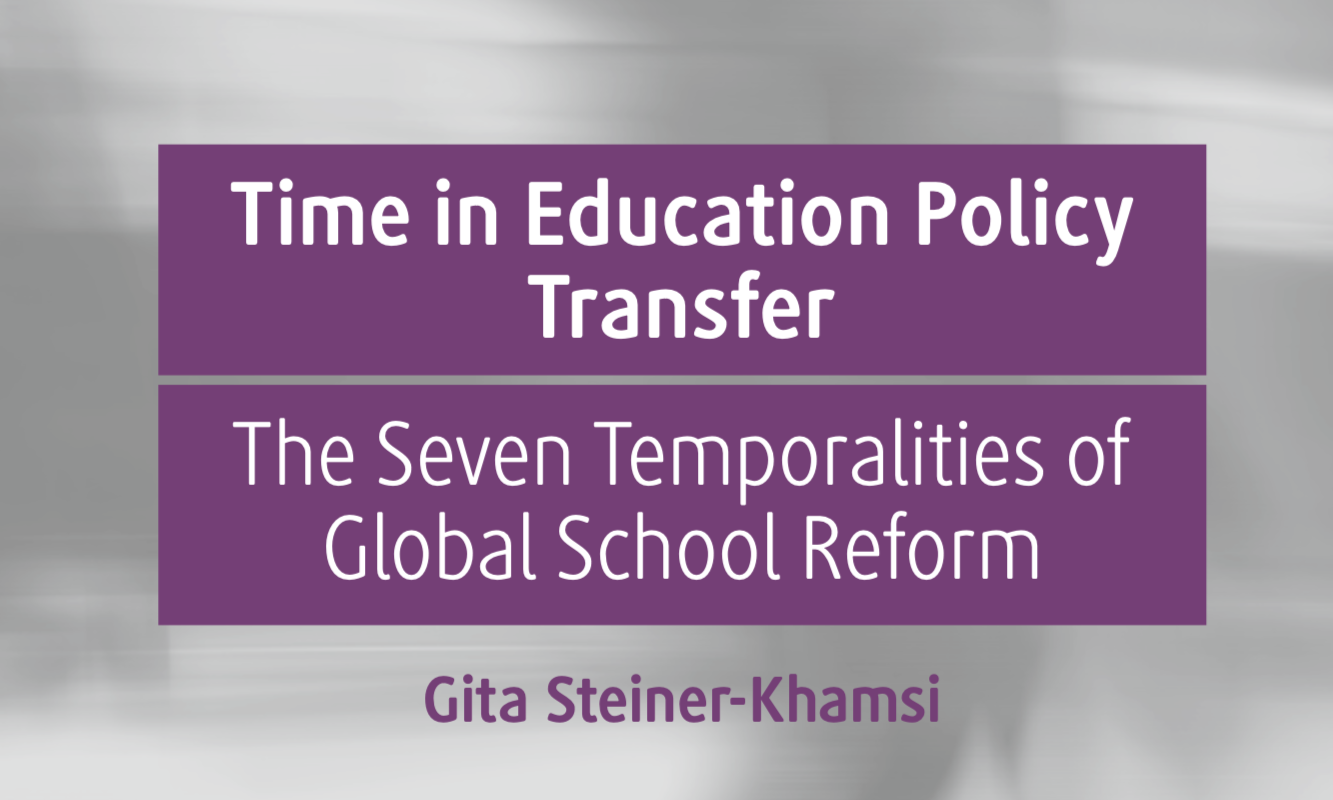Event Highlights: UNESCO Chair Book Talk: Time in Education Policy Transfer
Monday 15 September 2025
4 to 5.15 pm CEST / 10 to 11.15 am EST
Hybrid: 285 Grace Dodge Hall, TC College, New York (USA), and Online (Zoom)
This event was organised in partnership with Teachers College, Columbia University, the KIX EMAP Hub and the UNESCO Chair in Comparative Education Policy.
On 15 September, NORRAG hosted the UNESCO book talk on “Time in Education Policy Transfer. The Seven Temporalities of Global School Reform.” The author of the book, Gita Steiner-Khamsi, highlighted a few points made in the book. The summary was followed by comments and questions from three noted scholars and practitioners in the field of comparative and international education.” With 700+registrations, and participants joining online and in person from New York, the event was organised in partnership with Teachers College, Columbia University, the KIX EMAP Hub and the UNESCO Chair in Comparative Education Policy.
The event brought together scholars, practitioners, and students to reflect on how education reforms travel across countries and evolve over time. The series was opened by Professor Chanwoong Baek (Academic Director, NORRAG) , who introduced the panellists:
- Gita Steiner-Khamsi, William Heard Kilpatrick Professor of Comparative Education, Teachers College, Columbia University, and Honorary UNESCO Chair of Comparative Education Policy at the Geneva Graduate Institute
- Tomás Esper, Assistant Professor, Department of Theories of Education and Social Pedagogy, Universitat Autònoma de Barcelona
- Iveta Silova, Professor and Associate Dean, Mary Lou Fulton Teachers College, Arizona State University
- Arushi Terway, Senior Lead Research Associate, NORRAG
Professor Gita Steiner-Khamsi opened up her presentation by pointing out that the year 2025 marked 30 years of her academic appointment at Teachers College, Columbia University, during which she had the privilege of advising seventy doctoral students who completed their dissertations under her guidance. She used the book talk to point out how former and current doctoral students inspired her thinking on the topic of policy transfer, policy borrowing, or global education policies. In general, she focused on the temporal dimension of policy transfer, highlighting that policies change over time and may even become “zombie policies”, lingering in institutions long after their intended purpose. This cyclical view positions education policy as a loop, where endings are as important as beginnings. The tools of government to induce change are, as she noted, diverse, including laws, financial incentives, contractual arrangements with institutions, information campaigns, and standards-based evaluations, to name a few. Using examples from several countries, including China and Mongolia, she illustrated that reforms that appear universal are often adapted to local contexts. Reforms should be understood as packages of ideas, instruments, and change mechanisms, rather than isolated measures.
Dr Tomás Esper described the book “as more than a study of policy transfer—it is a handbook for understanding the policy process.” He highlighted three key contributions. First, Policies are living forces shaped by power relations and influenced by historical context, international organisations, and entrepreneurial actors. Examining moments of adoption is crucial to understanding how reforms evolve. Likewise, the book’s seven analytical categories provide a toolkit for studying reform spread, effects, and the evolution of school autonomy and accountability measures, situating reforms within broader theories of policy processes. Lastly, Historicizing reforms reveals shifts in dominant ideas influencing actors like the World Bank and OECD. The meso-level perspective allows readers to analyse how reforms are transferred in a specific context.
Dr Arushi Terway shared insights into the notion of innovative financing and how it has evolved over time. With its inception around 2010, there were no established models for innovative financing, but the need to explore equitable and sustainable funding became clear due to chronic underfunding in education. However, over the past decade, result-based financing has dominated the discussion, where the private sector’s role has expanded not only as an education provider as an upfront financier of projects. While public sector financing still exists, much attention is focused on result-based financing and public-private partnerships. Drawing from research at NORRAG, De. Terway contextualised these initiatives by examining their history within the education system and analysing the interests of stakeholders involved. The goal is to understand who these stakeholders are, why they participate, and how their actions support global objectives of additionality, equity, and sustainability.
Dr Iveta Silova reflected on the collaborative nature of research, reminding the audience that “research is never solitary — it is always an encounter, a dialogue, and a collaboration.” She commented on Professor Steiner-Khamsi for collaborating so closely with her current and former doctoral students; it makes them feel part of a larger intellectual community. She highlighted that policy innovation and ecological crises unfold simultaneously and urged attention to policy endings as much as adoption. She concluded with a provocative reflection on the possibility of “another policy time”, challenging educators, researchers, and policymakers to imagine an alternative pace and approach to reform.
Following the contribution from the panellists, the floor opened for questions from the audience. During the discussion, participants inquired about the role of new actors, including social media, in shaping the policy process and the future of non-coercive policy transfer. In answering these thought-provoking questions, Professor Steiner-Khamsi reminds us that UNESCO’s convening power plays an important role in calling government and stakeholders to learn and listen to each other, particularly in the precarious times we live in today.
Speakers:
- Chanwoong Baek, Academic Director, NORRAG, UNESCO Co-Chair of Comparative Education Policy at the Geneva Graduate Institute
- Tomás Esper, Assistant Professor, Department of Theories of Education and Social Pedagogy, Universitat Autònoma de Barcelona
- Iveta Silova, Professor and Associate Dean, Mary Lou Fulton Teachers College, Arizona State University
- Gita Steiner-Khamsi, William Heard Kilpatrick Professor of Comparative Education, Teachers College, Columbia University, Honorary UNESCO Chair of Comparative Education Policy at the Geneva Graduate Institute
- Arushi Terway, Senior Lead Research Associate, NORRAG

